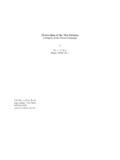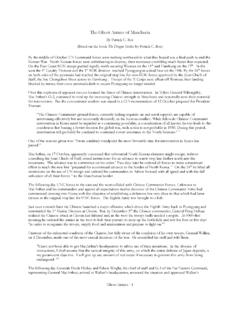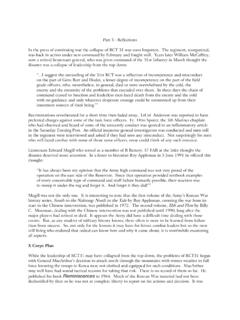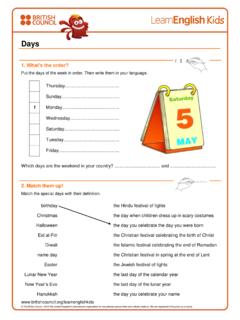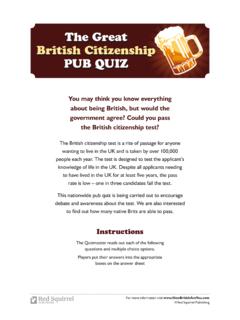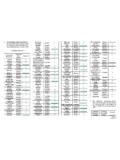Transcription of Treachery at Chosin - Chosin Reservoir
1 Treachery at ChosinbyPatrick C. RoeIt is quite possible that the Chinese attack at Chosin , and along the Chongchon in western Korea, wasgreatly aided by information supplied by a quadrumvirate of british spies: Donald Maclean, Harold KimPhilby, Guy Burgess, and Anthony Blunt, four of the most notorious british traitors of all time all of whomhad been recruited as Communist agents while as school at Cambridge in the early 1930s. Somewhere deep in the concrete bowels of the CIA at Langley, Virginia, is a file assessing the incalculabledamage they did to the effort in the Korean War. What they cost in lives cannot even be guessed at. That real story is not likely to be released in our time, if ever. But there is certainty that the three,individually or in concert, passed on a great deal of secret material to the Soviets. There is also evidencesome of that information was passed on to the Chinese who used it to plan their operations against UNCforces advancing into North Korea in the fall and early winter of 1950.
2 Great care was taken during the earliest days of the Korean War to keep the british fully informed. It was a way of presenting the war as an allied effort. The senior british representative in Washington, AirMarshal Tedder, received special, private, briefings from the chairman of the Joint Chiefs of Staff,General Bradley. One british officer had a special pass to the secret war room at the Pentagon. In theFar East MacArthur provided the british representative with private briefings. Beginning in July, 1950,reports from these sources began pouring into the American Department of the british Foreign Office inLondon. Those originating in the Far East were sent to the American Department as information copies. One of the most informative documents was the daily Far Eastern Command situation/intelligence report(SITINTREP) which reported the location, mission and situation of all UN forces down to battalion size,as well as the available information on enemy strength, dispositions and actions.
3 Philby arrived in Washington, D. C. in October of 1949 as the MI6 (Britain's secret intelligence service)resident in Washington. Information available to him would have included information on thediscussions within the Joint Chiefs and the National Security Council and other sensitive information. Inaddition to his general liaison duties he had two tasks. One was co-directing an effort together with theCIA to de-stablilze the communist regime in Albania. His other principal duty was to coordinate with theFBI in helping them in their search for "Homer," an unknown spy who had worked in the british Embassyin Washington in 1946. Unknown to the FBI but known to Philby was that "Homer" was actually view of Philby's very close relationship with top CIA officials he could not help but have been aware ofthe CIA's view that there was no evidence to suggest large scale Chinese intervention. And, as a routinematter, he probably had access to daily action reports from the Far East.
4 It was learned, later, that Philbyhad a secret photo lab in his basement wherein he made copies of information to be forwarded to theSoviets. Given his contacts and his position in the embassy he was in a position to provide the Soviets, andtheir Chinese allies, information on the buildup, on the debate on strategy after Inchon, ignorance of the Chinese Burgess arrived in Washington, D. C. in July of 1950. Burgess was a dissolute alcoholic andhomosexual whose behavior had become notorious throughout the british foreign service. Embassyofficials objected strongly to his posting to Washington but were told they had to accept it. What part Burgess played is not clear. At least one senior official of the embassy gave up attempting toget Burgess involved in his department. But there is evidence that early on Burgess had access to sensitivereports coming from the british Embassy in Beijing. Since Burgess was given an office in the central partof the chancery where other high level officials worked there is little doubt that either formally orinformally he had access to the most vital information.
5 Maclean, who assumed his duties as head of the American desk in the british foreign office in London onNovember 1, 1950, also had serious behavior problems. He had been sent home from Cairo because ofhis outrageous drinking and behavior and had spent some six months on medical leave undergoingcounseling. He was returned to duty in November not because he had improved but only because hismedical leave was about to expire. Thus Maclean, from November 1, 1950, had access to everythingpertaining to Korea including the location and movement of forces and the fact that the Far EasternCommand was not aware of the huge scale of the Chinese intervention or the location of Chinese ' behavior eventually caused him to be sent home from Washington, arriving in London in earlyMay, 1951. Not long afterward both he and Maclean became aware that they were under investigation,warned by some "Third Man" who was always assumed to be Philby.
6 Both secretly fled England andremained out of sight until they turned up in Moscow some two years Maclean is said to have given the Soviets everything of importance that he saw, there is nopublicly available review of the information to which Maclean had access. When the news of Macleansdisappearance became public in early June, 1951, the british Foreign Office issued a statement saying theAmerican Department dealt "principally with Latin American affairs." Issues regarding the U. S. werelimited to tourism and the welfare of british citizen in America. On the other hand Robert Cecil who hadbeen Maclean's principal assistant in the American department said that Maclean had "access to most ofthe important telegrams passing between the Foreign Office and posts abroad, as well as a selection ofcabinet papers" some of which Cecil found locked in Maclean's file cabinet after he fled to Rusk, later Secreatry of State, and who was assistant secretary of state for Far Eastern Affairs duringthe Korean War, said that, "It can be assumed, 1) anything we in our government knew about Korea wouldhave been known at the british Embassy and 2) that officers in the embassy of the rank of [Maclean, Philbyand Burgess] would have known what the british Embassy knew.
7 " And Dean Acheson, who was Secretaryof State at the time Maclean absconded exclaimed to an aide, "That sonofabitch knew everything!" Verne Newton, who carefully researched the british Foreign Office records for his book The CambridgeSpies, concluded that the british Foreign Office files had been purged to conceal the extent of Maclean'saccess. By a careful review of cables and telegrams to other branches of the Foreign Office which weresent as information copies to the American Department, Newton concluded that Maclean had access to allinformation across the board concerning the Korean the FBI and the CIA have refused to release any information on their investigation or their damageassessment. In researching this I submitted a Freedom of Information request to the FBI requesting whatinformation they had on Philby, Maclean and Burgess. I received a large case filled with, mostly,newspaper clipping and a few field reports.
8 But, hidden among them was a one page memorandum froma colonel in Army G-2 which appeared to be a thorough damage assessment. It was a print from amicrofilm, very blurred and difficult to read. I got in touch somehow with a woman at the FBI whosename I don t remember and asked her if she could provide a more clear copy. She said she could butwould I send the copy I had so they could find the original. Foolishly I did and never heard from heragain and never got my copy of the memo back. After some time I called the FBI. They had never heardof that particular of the Korean War have been reluctant to attribute any of the Chinese decisions and plans toinformation provided by espionage. In the past fifteen years a good deal of information has come bothfrom Russian archives, and from China in the form of histories and memoirs of major participants. Comparing some of the messages and decisions made by the Chinese with the movements anddispositions of UN Command forces at various times it is obvious that the relatively crude ChineseCommunist army had a source which provided very good information on the location and movement ofUNC units.
9 While it is circumstantial and may have come from other sources, here are some of theincidents which, if known that the time, would have incited raging paranoia in the mind of anyresponsible counter-intelligence Telegrams No. 21 - October 14 - Mao reports on the Korea situation: (1) The American First, Second and 24th Division, british 25th Brigade and the puppet[Korean] First Division are concentrating in the Kaesong Kumchon area along the 38th Parallelnorth of Seoul to prepare an attack on Pyongyang. According to today's dispatch, AmericanSecond division is planning to move to and be stationed near Kumchon. Given the abovementioned information, it seems that the Americans have made no final decision on whether ornot to attack Pyongyang, or when to make the attack.(2) The puppet Captial Division and third division have arrived at Wonsan. Their Sixth,Seventh and Eighth divisions are gradually moving toward areas around Wonsan to receivesupplies by sea.
10 ()3) American First Marine Division remains in Seoul. American 25th Division is stationed alongthe Taejon - Suwon line. American Seventh Division lies along the Taegu - Pusan line. TheHeadquarters of American Eighth Army is located at Taejon. Two puppet divisions are locatedin various parts of the South. The Eighth Army s order for the attack north had designated the Kaesong area as the assembly area for ICorps composed of the 1st Cavalry Division, the 24th Division, the 1st ROK Division and the BritishBrigade. Wonsan had been secured by the 3rd ROK Division on the 11th, and the Eighth Army CP hadopened in Seoul on the 12th so it appears that Mao s information was two days out of date, Mao sinformation seems to have come from the daily telecon of the would have had access to the daily telecon which, in most cases, carried only a Secret classificationand was widely distributed. Mao Telegrams 23,33,36,37,43 and45 - October 21 through 25 With Chinese forces still out of contact Mao provides Peng with a daily report of the movementof the 6th, 7th and 8th ROK Divisions as they move from Chorwon toward Tokchon, thenHuichon and Onjong.
